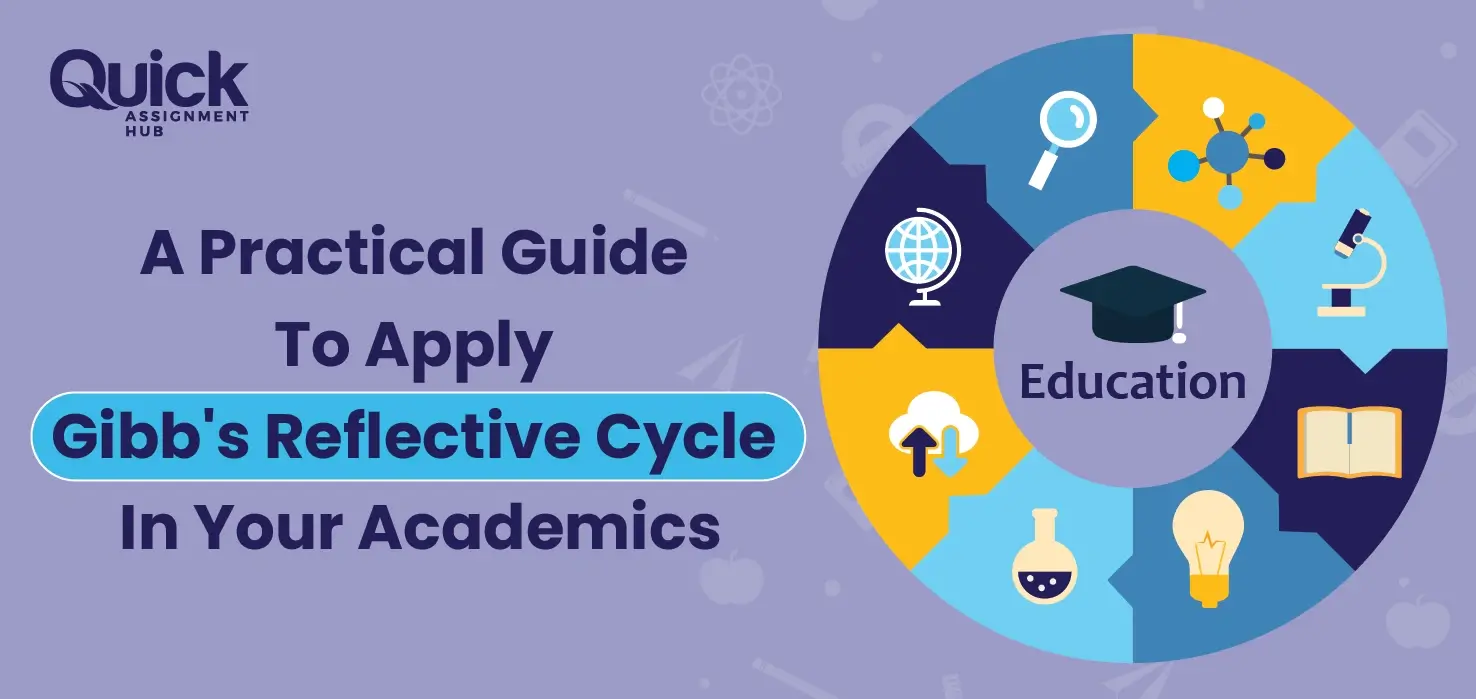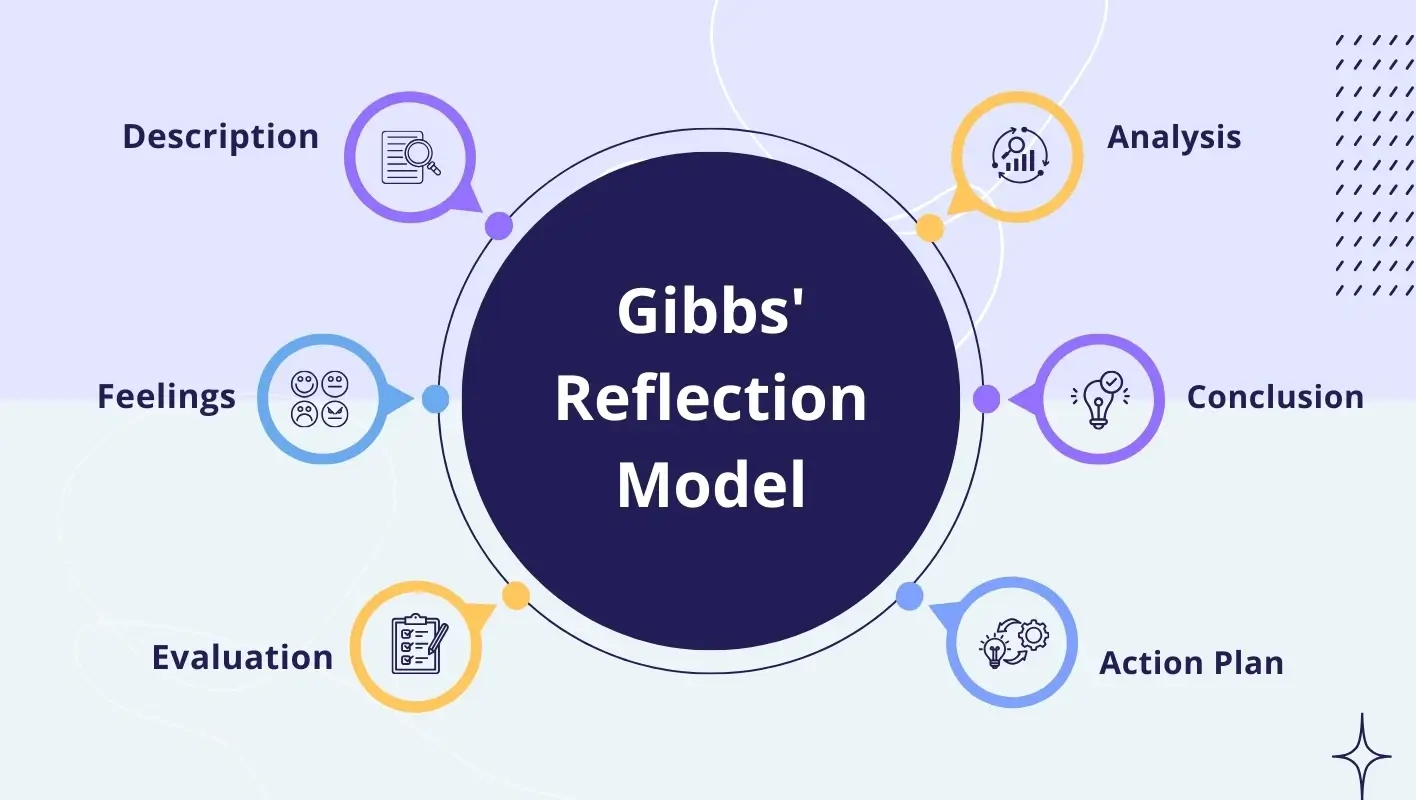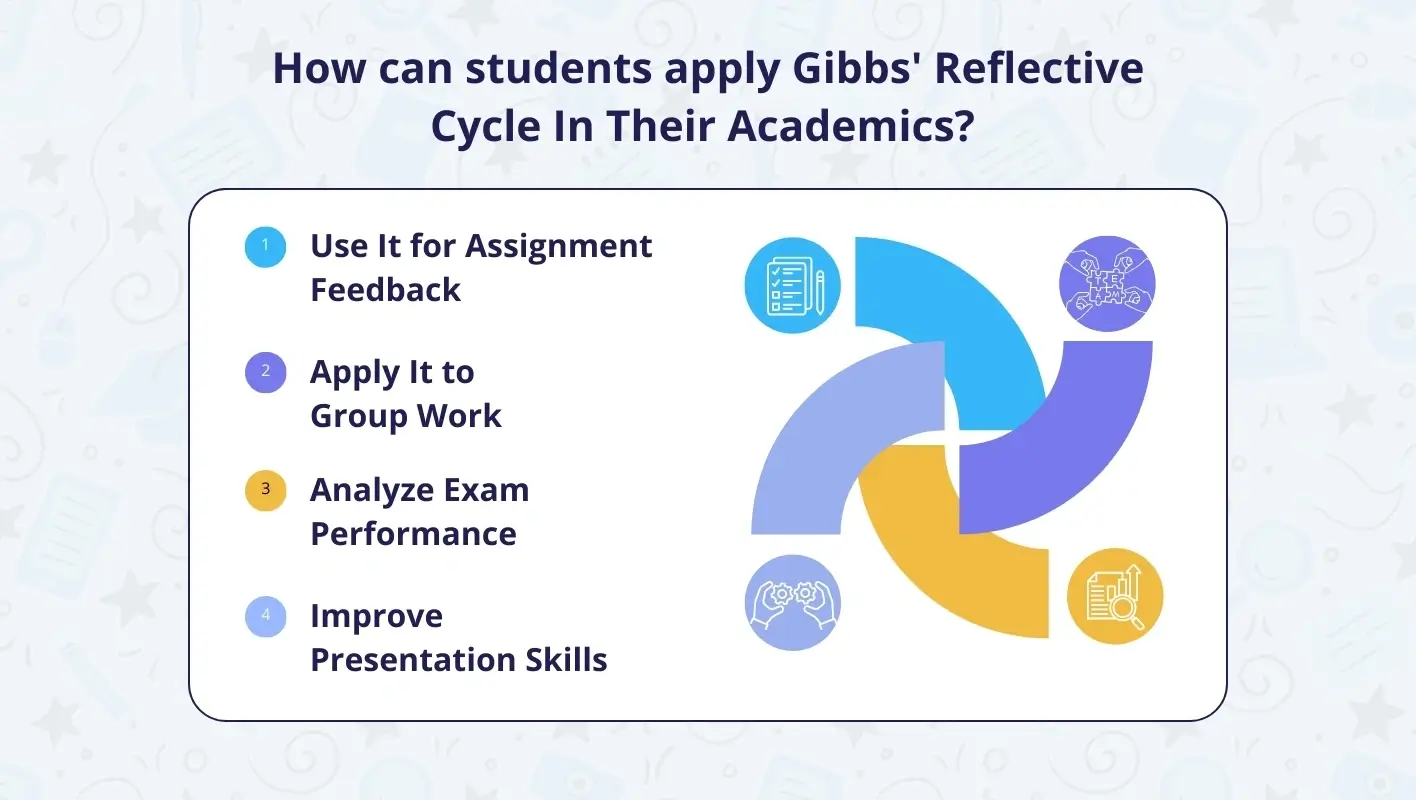
In the realm of learners, learning is not merely a backbone of education; it is achieved through understanding and doing homework. Learning, therefore, requires the student to go through experiences, assess them, and then apply the findings in the future. Reflection is an effective way to allow students to receive a broader perception of their educational process. The most efficient models that can be used for structured reflection include Gibbs' Reflective Cycle.
Graham Gibbs introduced this model in 1988. It is a highly structured model that directs an individual through six stages when evaluating an experience, whether positive or negative. In particular, on the students' side, using the acquired knowledge on Gibbs' Reflective Cycle application can be a revelatory experience. Formerly, it assists in comprehending academic problems, developing individuality, and developing critical thinking. In this guide, you will learn about Gibbs' Reflective Cycle, the stages used in the process, and the advantages, disadvantages, and uses of the cycle by students.
Gibb's Reflective Cycle is predicated on the idea of progression from one's present state to the next, to the next and so on in a cycle of cycles. The concept behind the model is to allow the person to analyze what is happening to them and draw valuable conclusions. The six stages of Gibbs' Reflective Cycle are as follows:

Description: What occurred before, during, and or after the experience?
Feelings: What did you think and feel at that moment?
Evaluation: What was successful, and what was not?
Analysis: What lead to these circumstances?
Conclusion: What did you learn from the experience?
Action Plan: How will you handle similar incidences in the future?
This cycle is practiced by many disciplines, academic, health care, and organizational professions, to bring about reflection and personal growth.
This stage is the first stage. Here, you only need to provide facts about what took place. It is essential to describe the information about the situation or your experience and not to give any opinions. It includes questions like: What happened? When did it happen? Who was involved, etc.
During this stage, the focus is on emotions that you experience during the different phases of the process. It includes questions like: how did you feel? Were you happy or sad, or did you feel any other emotion? How your feelings may have affected your actions? This step signifies the acknowledgement of your reaction to the experience.
Evaluation is an essential element for any process as it is essential to achieve the goals desired. In this stage, you evaluate the objectives that were met and the ones that were not. Evaluate what worked well during the process, what did not, and the same about the result of the experience.
In this stage, you analyze the situation; the deeper you analyze, the better your results. Why was such an action made, and why did things turn out this way or that way? Determine the impact of some of the factors on the performance of the activity, whether internal or external factors.
This last stage is always based on your analysis of the situation and what has been learned from the experience. Some questions are as follows: What have you learned? How will you deal with a similar situation differently? It involves understanding the lessons learned and acknowledging skills or awareness that boost your future performance.
Last of all, the action plan involves the plan of what you will do if similar scenarios occur in the future. Explain measures that should be taken to attain the above objectives or exclude the likelihood of similar failures based on your learning.
For instance, you were involved in a group project a while back. Stage one will identify the project topic, the roles that were given to you, the actions that were made, and lastly, the results achieved. In stage two, you may remember feeling stressed when speaking to a class, but you may have gotten excited when your team praised you for your participation. The most important thing was that the members were able to cooperate, but the team's inability to work with time constraints proved quite a challenge. Lack of effective communication may have made team members repeat their assignments and miss some deadlines. More frequent meetings should have been conducted to make sure everyone is in regard with each other. To avoid such a situation in the following group projects, develop a timeline to ensure that the project is completed as scheduled or arrange for the tasks to be completed earlier and, where necessary, organize a weekly progress meeting.
Some of the advantages of using the Gibb's Reflective Cycle are:
Enhances Critical Thinking: Gibb's Reflective Cycle helps students think deeply about why things occurred and how they might do it better in the future. It is so helpful in academic work, which makes it so important.
Improves Learning Outcomes: Reflexivity techniques enable students to make conclusions when they notice weaknesses, and they can get help or use appropriate techniques.
Develops Problem-Solving Skills: The evaluation of experiences articulates an attitude of maintaining a proactive approach to a challenge, which enables the student to find solutions.
Promotes Continuous Improvement: Students can apply the knowledge learned through the Gibb's reflective cycle in the future through the formulation of action plans.
While Gibb's Reflective Cycle is widely regarded as a helpful tool, it comes with its limitations:
Over-Simplification: This structured format may even impose a lot of constraints by trying to exaggerate the method of thinking while doing a particular task, which in turn may inhibit the amount of reflection done.
Time-Consuming: It should, however, be noted that when striving for quick results, going through all six stages in detail is rather time-consuming for busy students.
Risk of Overthinking: Gibb's Reflective Cycle can cause overthinking or extreme self-criticism over an experience.
Dependency on Writing Skills: Another concern for learners with poor language skills is expressing themselves, as this format is highly dependent on writing skills.
Some of the ways how the students in their academics can apply Gibb's Reflective Cycle:

Use It for Assignment Feedback: Once the assignment is done, you can analyze how the assignment was written, how the final result was accomplished, and to what extent the various aspects of their writing can be enhanced.
Apply It to Group Work: There are usually concerns like lack of communication or differences in perception and thinking among the members in a group project. As a student, you can, therefore, use this reflective cycle to find why more efficient collaboration did not occur with the view of planning how to improve collaboration in the future.
Analyze Exam Performance: Following this reflection, you can review their study plans, grasp lessons they found challenging and design changes for another round of preparation.
Improve Presentation Skills: This helps you improve your presentation skills by considering the presentation style, the audience's interest, and the structure of the material. It pinpoints areas that could be improved for the following presentations.
Looking at the work of Gibbs, it can be difficult for most of your students to understand when to apply this model of Gibb's reflective cycle. Quick Assignment Hub is one such platform where you can reach out for help. Here' show they can help:
Expert writers who are well aware of guidelines in developing reflection essays using Gibbs' model.
Curate customized assignments that are specific to their particular academic level of study and requirements.
Affordable help with a commitment to timely delivery without sacrificing quality.
Whether it is helping students with a Gibb's Reflective Cycle template or writing the reflection part of their assignments, the students can turn to Quick Assignment Hub to turn to.
Reflection in academics is not a skill but a tool that may help students enhance their performance. It is thus essential to apply Gibb's Reflective Cycle to your learning to improve your understanding of processes, contributing elements, and problem-solving and be ready to handle future challenges.
Despite such limitations, the systematic approach that the model provides is constructive for any student who wants to enhance their performance. And when you feel stressed, there are professional services such as Quick Assignment Hub to offer you hand-holding throughout.